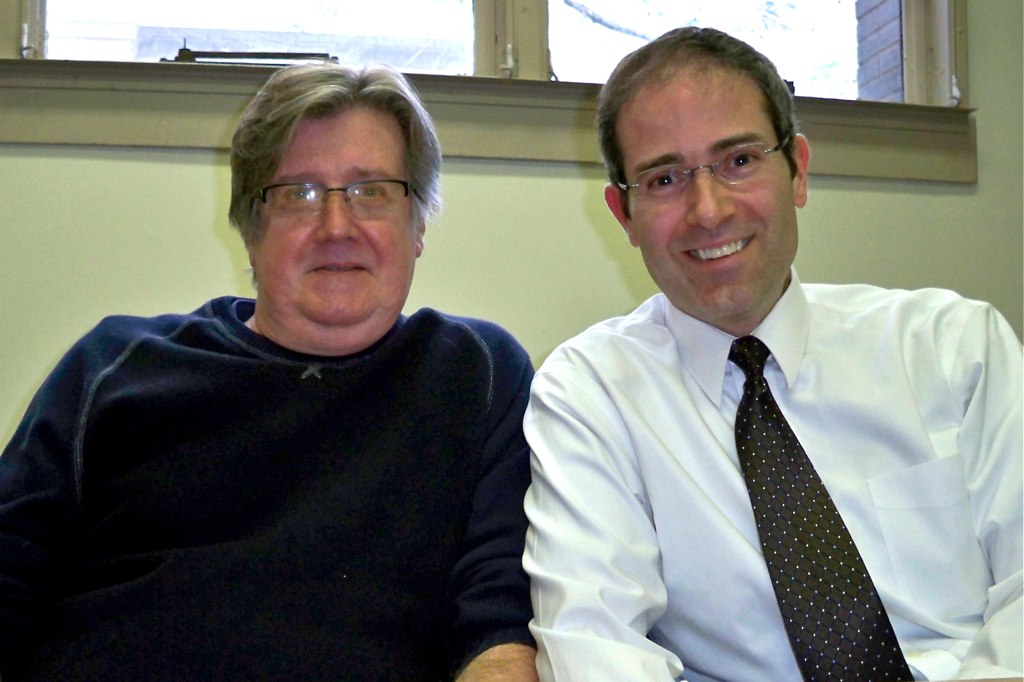
Leonard Lawlor, Edwin Earl Sparks Professor of Philosophy and Co-director of the Society for Phenomenology and Existentialist Philosophy, joins me for episode 28 of the Digital Dialogue in which we discuss his recent work on the philosophy of immanence and the questions of human and animal life.
Len has published widely, and I only mention two more recent texts related to our discussion here:
This is not Sufficient: An Essay on Animality and Human Nature in Derrida, Columbia University Press, 2007.
The Implications of Immanence: Toward a New Concept of Life, Fordham University Press, 2006.
The title of this podcast refers to the name Lawlor gives to the people who gather as a “We” in a non-totalitarian social bond rooted in what he calls the power of powerlessness. The basis for our discussion is his essay Anachronism and Powerlessness: An Essay on Postmodernism, a version of which is to be published later in 2010.
Digital
Dialogue 28: Leonard Lawlor on “Friends of Passage”
To subscribe to the Digital
Dialogue through iTunesU, click here.


Thank you for this podcast and the opportunity to comment. I sympathize with your new sensitivity, in defense of immanent (animal) otherness in a field of multiplicity and friends of passage, possibly in co-responsibility to experience. However, it seems to me that the need to eliminate the autonomy, unity and hierarchy of the cogito, in an anti-platonistic move, is unnecessary. As Bergson was quoted in the Stanford Encyclopedia of Philosophy by prof. Lawlor, if we “Re-establish the duality [of forces], the difficulties vanish” (The Two Sources, p. 96). That duality may not be the immanent multiplicity you assume he meant. Bergson compared the mind to the universe as described by Einstein (and discussed it with him on radio – tapes still available), however that is not how intuition deals with reality. I believe he meant to be precise and overthrow what he called "sociobabble". The precision had to be scientifically, judicially and journalistically accounted for, not indeterminate. And that implies a passion for independent confirmation, which is a dualistic value engrained in almost all facets of our lives, including mental health. This dualism is a hierarchical system in our experience, seeking and if found, following Truth (what is independently confirmed) at one level within another. This is a far cry away from the "friends of passage" idea and requires us to be as independent as we can, to honor the truth and our passion for justice, as Bergson called it. So animal rights to be heard even when it is only murmur, and be co-responsible for that experience, is a matter of precise representation and reflection of the environment, the other or reality in intuition, at one level. More reduced, that is sensing what we know (intuition) and knowing what we sense (realization) and at higher levels of functional structure or less reduced, that is trying (realizing what we intuit) and valuing (intuiting what we realize). This is not the "closed morality and static religion" Bergson accused Kant of, but the other source of morality and religion, which never emerged in postmodernism, especially not in Derrida's deconstructionism.
Thank you for this comment. But I have to say that I do not agree. I think the new sensibility I am seeking is entirely consistent with and based in Bergson's idea of open morality and dynamic religion. It requires an intuition, but the problem is: how to get the intuition? For Bergson, it is through creative emotions. What needs to be motivated is an emotion that opens one to all of life. Moreover, this type of openness is precisely what Lyotard was interested in under the word "postmodernism." Postmodernism is about creativity, as in creative emotions. It is about the openness of the future. Also, Derrida wrote about Bergson in an article called "Faith and Knowledge," in which he implies that deconstruction is inspired by the idea of open morality.
Honored that you are willing to have this conversation with us.
Open morality in my mind (and this is how I read Bergson) can only be the willingness to discuss the first principles of our thoughts, words and actions with anybody, even at an emotional level. To me, that is our willingness to always seek independent emotional- or (also) rational confirmation to turn emotion into motivation and accountability. It takes emotional creativity to adapt to the other or groups of others, without losing oneself, as much as being independent without getting isolated does. In certain political circles, this kind of criticism towards oneself and to others in debate and discussion, is massively opposed and found unfriendly, excusing accusers to be harsh in return, only this time intentionally. Derrida's compatriot and contemporain René Girard explains this as "mimetic desire" to be friendly and therefore uncritical, so that confirmation is guaranteed, be it dependent upon one another (cronyism). The scapegoat is the one who is (verbally) stoned and kicked out. The only time this happened with global consequences, was in the beginning of Christianity. I will have to read up on Derrida, how deconstruction could possibly be criticism, other than breaking down what another for himself has put together seeking, finding and following independent confirmation, that is Truth, by means of Derridean theory that cannot be proved (only approved), plus an intimidating majority of friends dependently confirming each other and never minding the Truth.